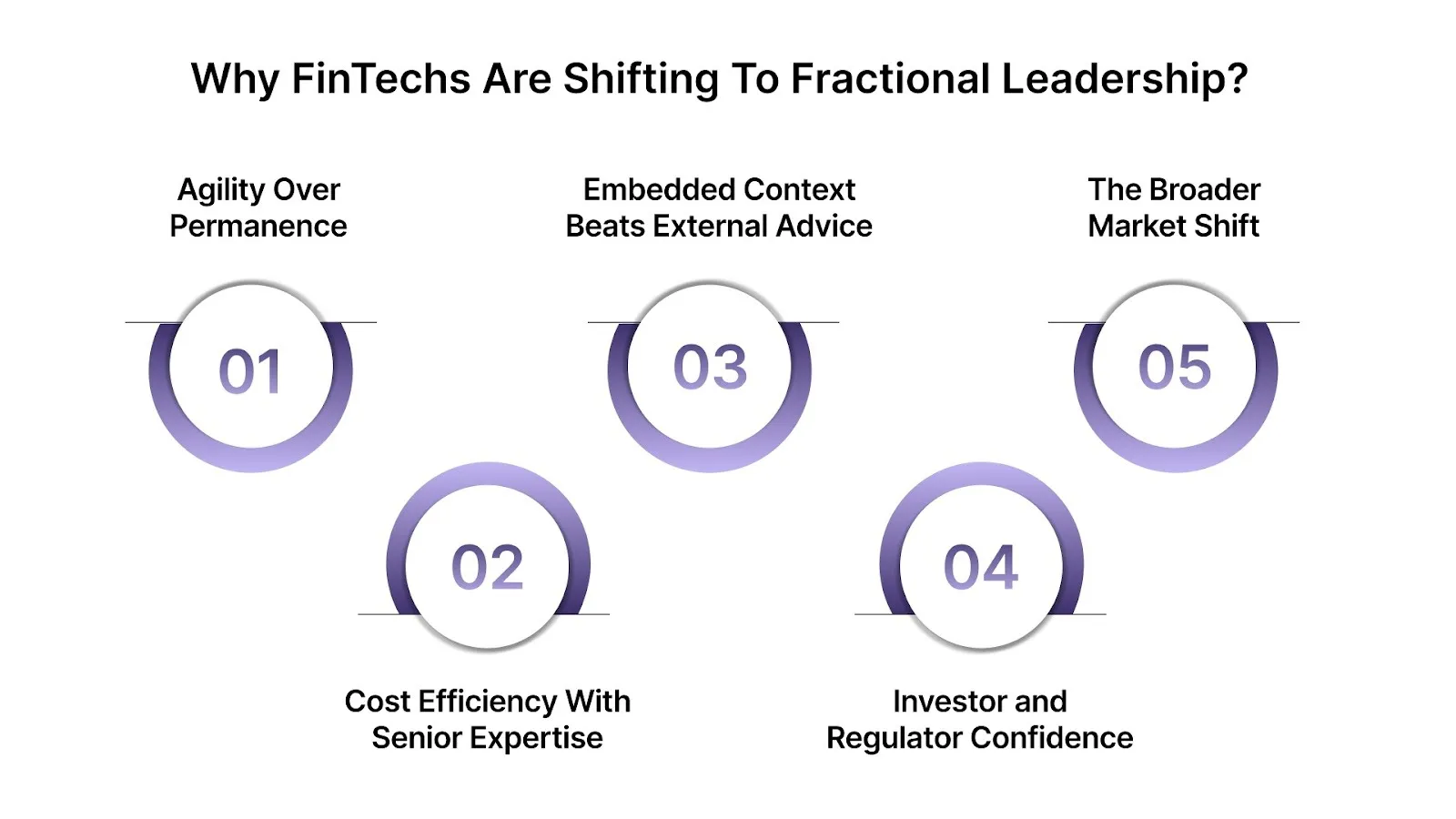Nov 13, 2025
Fractional CRO vs CFO: Key Differences in Risk Management

By Fraxtional LLC

Funding rounds move fast. Regulations don’t.
That’s the gap every fintech founder eventually runs into, when the speed that once fueled innovation now demands guardrails, audits, and accountability.
When investors start asking, “Who’s managing your risk?” there are two roads to take.
One leads to consulting firms like FS Vector, known for their regulatory frameworks and sponsor-bank readiness playbooks. The other leads to fractional C-suite leadership, seasoned compliance heads, and risk officers who embed themselves directly into startup teams.
Both paths aim for control, though they reach it in distinct ways.
Consultants advise from the sidelines; fractional leaders build inside the team.
And as fintechs, crypto firms, and digital banks scale under heavier regulatory scrutiny, this choice has quietly become a defining one shaping how they operate, report, and grow.
Key Takeaways
- FS Vector offers regulatory consulting, while fractional leaders like those from Fraxtional embed within fintechs to manage ongoing compliance and risk.
- FS Vector suits licensing and policy design; fractional executives excel in hands-on, scalable compliance leadership.
- Fractional models provide executive-level expertise without the full-time cost or long retainers of traditional consulting firms.
- U.S. fintechs are increasingly replacing static consulting support with dynamic, on-demand fractional CROs and CCOs.
- Fraxtional bridges both worlds, offering regulatory depth and operational continuity through seasoned fractional leaders who scale with your business.
Understanding the Two Models

Fintechs manage risk in two main ways: By outsourcing it to consultants or by embedding leaders who handle it firsthand. One offers expert guidance from the outside while the other brings leadership inside the business.
Choosing the right model for your growth stage determines how well your compliance scales.
FS Vector and the Consulting Playbook
FS Vector represents the classic compliance consulting model: a team of policy specialists, regulatory advisors, and former bank executives who step in to build frameworks from the outside.
They design licensing pathways, draft AML policies, and liaise with regulators on behalf of clients. For founders in early or pre-licensing stages, that external expertise is invaluable: you get instant credibility and documentation that meets regulatory expectations.
But the consulting model has limits. It thrives on deliverables, not daily decisions. Once the reports are filed and the playbooks handed off, execution falls back on the startup. For fast-moving fintechs that pivot weekly and ship products in real time, that distance can feel costly; the insights are right, but they arrive a step too late.
Fractional C-Suite Leadership: The Embedded Model
Fractional risk and compliance leaders flip that structure inside out. Instead of delivering advice from a distance, they join the team part-time but are fully accountable. A fractional Chief Risk Officer or Chief Compliance Officer sits in strategy calls, reviews transactions, and writes policies with the same urgency as a founder.
This model has gained traction because it offers senior-level leadership without the full-time headcount costs. For Series A and growth-stage fintechs, fractional leaders bring three distinct advantages: they scale with the business, stay close to operations, and translate regulatory language into actionable processes.
Think of it as hiring a C-suite on subscription, the same caliber of leadership, minus the overhead and board-level bureaucracy.
Choosing between consulting and fractional leadership often comes down to who’s making the decisions and how close they are to the business. To see the real difference, it helps to look at how each model performs when placed in key executive roles.
Role-Based Comparisons

Before we break down individual roles, here’s a quick overview of how FS Vector and fractional C-suite leadership differ in practice.
This distinction becomes sharper when viewed through specific executive roles.
1. Chief Risk Officer (CRO)
In fintech, risk defines investor confidence and operational stability. A Chief Risk Officer ensures that business growth doesn’t outpace internal controls.
- FS Vector CRO: Designs frameworks, sets up governance documents, and advises boards on regulatory requirements. Their approach is structured, documentation-driven, and valuable for firms preparing for audits or licensing.
- Fractional CRO: Acts as part of the core team analyzing exposures in real time, coordinating with finance and operations, and ensuring every decision reflects the company’s risk appetite.
Impact: While FS Vector helps establish risk foundations, a fractional CRO keeps the system responsive, helping startups anticipate liquidity or compliance gaps before they become incidents.
2. Chief Compliance Officer (CCO)
As fintechs expand across products and markets, compliance becomes a growth enabler rather than a barrier. The CCO bridges innovation with regulatory discipline.
- FS Vector CCO: Crafts compliance programs, manages filings, and supports sponsor-bank readiness. They ensure all documentation aligns with current frameworks.
- Fractional CCO: Translates those frameworks into action, running training, managing periodic reviews, and integrating compliance checks into day-to-day operations.
Impact: Consulting shapes the rules, while fractional leaders keep them relevant.
3. AML / BSA Officer
The AML Officer’s role has expanded beyond detection to prevention, a core expectation from regulators and banking partners alike.
- FS Vector AML Officer: Establishes AML programs, assists with initial licensing, and prepares suspicious activity reporting templates.
- Fractional AML Officer: Builds on that foundation, managing live monitoring, resolving alerts, filing SARs, and ensuring policy adherence across teams.
Impact: FS Vector ensures compliance readiness; fractional AML officers maintain it daily, reducing the risk of missed red flags and audit escalations.
4. Head of Audit / Governance
Internal audits are where theory meets practice and where leadership accountability is tested.
- FS Vector Audit Lead: Conducts independent audits, identifies control gaps, and recommends corrective actions.
- Fractional Audit Lead: Executes those recommendations, sets internal tracking systems, and ensures follow-up is completed before the next cycle.
Impact: Consulting pinpoints weaknesses; fractional leadership builds the mechanisms that prevent them from recurring.
5. Chief Information Security Officer (CISO)
Cybersecurity has become a compliance metric in itself. Whether it’s data handling under GDPR or transaction monitoring under AMLA, security leadership shapes regulatory trust.
- FS Vector CISO: Advises on frameworks like NIST or ISO 27001 and reviews infrastructure risks.
- Fractional CISO: Leads implementation, conducting breach simulations, managing vendor risk, and embedding data protection protocols into daily workflows.
Impact: FS Vector brings technical direction; fractional CISOs bring operational resilience.
6. Chief Governance or Policy Lead
Governance connects all functions, ensuring the board, regulators, and internal teams move in sync.
- FS Vector Governance Advisor: Structures governance policies and compliance documentation.
- Fractional Governance Lead: Maintains board dashboards, aligns audit and compliance reporting, and integrates ESG and ethical practices into corporate operations.
Impact: Across all roles, one pattern emerges clearly: FS Vector brings the frameworks; fractional teams turn them into daily practice.
Most fintechs begin with external consulting to meet regulatory thresholds, but as they scale, the need shifts toward embedded leadership, professionals who live the compliance reality daily and evolve it with the business.
Cost, Scope, and Engagement Models

Choosing between FS Vector and a fractional C-suite model often comes down to how long you need the expertise and how deeply you want it embedded in your business.
Cost and Engagement Type
FS Vector operates like a traditional consulting firm; clients engage on a project or retainer basis, paying for predefined deliverables such as AML policy drafts, licensing applications, or audits. The pricing reflects scope and complexity, often ranging from a few thousand dollars per engagement to multi-quarter retainers for ongoing advisory.
Fractional leadership, in contrast, follows a flexible part-time model. Companies pay a monthly or hourly rate for access to senior-level executives, a CRO, CCO, or AML Officer, who contribute consistently without the full-time salary or benefits package. The cost typically equals 25–40% of a full-time executive, while still offering strategic oversight.
Put simply, consulting delivers documentation, and fractional leadership drives decisions.
Scope of Work
The consulting model is designed for finite mandates, such as obtaining a license, setting up compliance infrastructure, or passing an external audit. The focus is on output.
The fractional model is continuous, leaders are involved in live decision-making, risk assessments, and cross-functional meetings. They don’t just design frameworks; they maintain them through regulatory changes, audits, and growth phases.
This makes the fractional structure ideal for Series A+ fintechs, post-licensing crypto startups, and banks managing multiple fintech partnerships, where compliance is a daily function rather than an annual checkbox.
Flexibility and Continuity
With FS Vector, once a project ends, the engagement resets, and institutional knowledge often resets with it. Fractional leaders eliminate that gap. They evolve with the company, retaining context, relationships, and regulatory history.
For fast-moving fintechs, that continuity saves time during audits, regulator queries, or investor due diligence, where having an embedded risk lead who already knows the system can mean weeks shaved off response cycles.
When Each Model Wins.
Consulting models like FS Vector suit early-stage or pre-licensing fintechs that need structured documentation and external validation.
Fractional leadership, on the other hand, fits companies past that setup stage, where compliance is ongoing, risk evolves daily, and leadership continuity becomes a competitive edge.
Practical Use Cases for Each Model

Every fintech’s compliance needs evolve with scale. What works for a startup chasing its first license won’t suit a growth-stage company managing multiple partnerships.
Here’s how consulting and fractional models align with each growth phase and when each delivers the most value.
Seed and Pre-License FinTechs: The Regulatory Foundation Stage
At this stage, speed and credibility matter most. Startups often don’t have in-house compliance talent or established banking relationships.
- What they need: Licensing support, AML policy creation, and initial regulatory filings.
- Best fit: FS Vector’s consulting model. It offers turnkey frameworks and institutional knowledge to help startups clear early regulatory checkpoints.
- Why it works: Consulting brings documentation precision and regulator-facing polish, perfect when credibility outweighs operational continuity.
Fractional leadership isn’t yet cost-effective here; the focus is still on setup, not sustained oversight.
Series A FinTechs: The Growth and Implementation Stage
Once funding arrives, compliance shifts from “what we need to file” to “how we build controls that scale.”
At this point, speed of execution and day-to-day adaptability matter as much as policy design.
- What they need: Real-time oversight, sponsor bank coordination, and team-level compliance training.
- Best fit: Fractional leadership. A part-time CRO or CCO integrates within the team to operationalize policies and respond to daily compliance questions.
- Why it works: Fractional executives offer the experience of senior regulators without the full-time cost, aligning compliance with business velocity.
This is where consulting handovers evolve into embedded execution.
Series B and Expansion-Stage FinTechs: The Governance Maturity Phase
Scaling fintechs face more complex risk landscapes, cross-border regulations, multiple partner banks, and investor due diligence cycles.
- What they need: Continuous monitoring, audit readiness, and board-level reporting.
- Best fit: Fractional C-suite model. Leaders like fractional CROs and AML officers provide consistent oversight and ensure controls evolve with expansion.
- Why it works: Fractional leadership builds institutional memory — the same leader who handled your first audit can guide your next one across jurisdictions.
Consulting may still assist with specialized tasks, but strategic control belongs inside the company.
Established FinTechs, Banks, or PE-Owned Entities: The Hybrid Phase
At this level, compliance is reputational. Mature firms often blend internal risk teams with specialized consulting.
- What they need: Independent audits, policy benchmarking, and regulatory posture assessments.
- Best fit: Hybrid model. Consulting partners like FS Vector handle specialized reviews, while fractional leaders sustain governance internally.
- Why it works: It combines external validation (credibility for regulators and investors) with internal control (agility and speed).
This structure reflects how most successful fintech–bank ecosystems operate today.
Partner Banks and BaaS Platforms: The Ecosystem Stage
Sponsor banks and embedded finance platforms carry dual exposure, their own compliance and that of partner fintechs.
- What they need: Ongoing oversight of fintech partners, periodic audits, and adaptive policy frameworks.
- Best fit: Fractional leadership. Embedded risk officers act as the connective tissue between internal teams and external fintech clients.
- Why it works: Fractional governance ensures each partner maintains compliance alignment without adding full-time overhead.
This approach scales oversight without scaling headcount.
Across stages, the shift isn’t about replacing one with the other; it’s about timing.
When speed matters and compliance has to live inside operations, fractional leadership fits naturally.
Why FinTechs Are Shifting to Fractional Leadership

Over the past few years, fintechs have started rethinking how they structure leadership. What began as a cost-saving experiment has evolved into a deliberate strategy, one that gives startups access to executive-level expertise without slowing them down.
1. Agility Over Permanence
Traditional consulting and full-time executive hires both move slowly. Fintechs operating in evolving regulatory environments need speed, the ability to react to new guidance or risk triggers in days, not quarters.
Fractional leaders offer that flexibility. They plug into existing systems, make decisions quickly, and exit once stability is restored, no long onboarding cycles or fixed contracts.
2. Cost Efficiency With Senior Expertise
Hiring a Chief Risk Officer or Chief Compliance Officer full-time can exceed $300,000 annually, excluding benefits and bonuses. Fractional models allow fintechs to access that same expertise at a fraction of the cost, typically 25–40% of a full-time salary, while keeping leadership continuity intact.
For early and growth-stage firms managing burn rates, this balance between cost control and leadership quality is decisive.
3. Embedded Context Beats External Advice
Consultants deliver valuable frameworks, but they operate from the outside. Fractional executives live inside the operation, understanding culture, tech stack, and team dynamics. That insider perspective often translates into stronger, faster compliance execution and fewer disconnects between policy and practice.
4. Investor and Regulator Confidence
Institutional investors increasingly expect startups to demonstrate governance maturity early. Having a fractional CRO or CCO signals that compliance is integrated.
Likewise, regulators view fractional executives as accountable signatories, not consultants. This perception shift has made fractional appointments a credibility booster during licensing or Series A due diligence.
5. The Broader Market Shift
The trend extends beyond compliance. Fractional CFOs, CMOs, and CISOs have become standard in SaaS and financial services. The same evolution is reshaping risk and compliance, where the leadership gap used to be hardest to fill.
Fintechs are learning that the goal isn’t to “own” a full-time C-suite, but to access expertise as a service, deep, agile, and precisely when needed.
Why Fraxtional Leads the Shift

Fractional leadership has become the natural next step for how companies build compliance teams, and it’s exactly where Fraxtional operates best.
As fintechs, banks, and crypto firms balance agility with accountability, Fraxtional delivers what the next generation of compliance leadership requires: depth, adaptability, and credibility at scale.
1. Expertise Built at the Top
Fraxtional’s team comes from Fortune 500 banks, global consulting firms, and high-growth fintechs, leaders who’ve seen both sides of regulation: the rigidity of institutional systems and the fluidity of startups.
That dual perspective allows them to design compliance programs that satisfy regulators while supporting innovation.
2. A Fractional Model Designed for Regulated Growth
Unlike consulting firms that focus on advisory deliverables, Fraxtional embeds its executives directly within client operations.
Its model scales seamlessly, offering fractional CROs, CCOs, and AML officers who operate as part of the leadership team without the overhead of a full-time hire.
Each engagement is built around measurable goals: improved audit readiness, faster licensing timelines, and cleaner sponsor-bank relationships.
3. Full Spectrum of Compliance Leadership
Fraxtional covers every critical layer of fintech and banking compliance:
- Money transmitter licensing across U.S. jurisdictions
- SOC 2 readiness and audits
- Independent BSA/AML reviews
- Policy development and regulatory documentation
- Governance and risk frameworks tailored for growth-stage fintechs
This breadth means fintechs can access a unified compliance framework without juggling multiple vendors or fragmented consultants.
4. Designed for Flexibility and Speed
Fraxtional’s engagements are structured around startup realities, agile timelines, shifting priorities, and evolving regulatory environments.
Clients can scale involvement up or down based on funding stage, audit cycles, or expansion plans, ensuring leadership support is always proportional to need.
5. Proof Through Partnerships
Recognized among the Top 10 Fractional Compliance Leadership Providers in the U.S. (2024), Fraxtional has worked with fintechs, sponsor banks, and private-equity firms that require trusted oversight without operational friction.
Its success lies in translating decades of institutional expertise into flexible, embedded leadership, making compliance a strategic advantage rather than an obstacle.
By combining the precision of consulting with the agility of embedded leadership, Fraxtional embodies the future of risk and compliance management: fractional, focused, and future-ready.
Ready to add proven risk and compliance leadership to your fintech, without a full-time headcount? Connect with Fraxtional’s team of fractional CROs and CCOs.
Conclusion
The decision between consulting and fractional leadership isn’t about one being better than the other; it’s about what your business needs at its stage of growth.
Consulting firms like FS Vector bring depth in regulatory interpretation and licensing pathways, ideal for startups navigating early-stage frameworks. But as fintechs move from planning to execution, they often need leaders who can own compliance day-to-day, align it with business goals, and scale it in real time.
Fractional executives at this stage become the bridge between advisory and execution.
Compliance is shifting from routine paperwork to a genuine driver of growth. Companies are realizing that expertise and flexibility can power the same strategy without competing.
That’s where Fraxtional comes in, helping fintechs, banks, and investors scale responsibly with seasoned fractional CROs, CCOs, and AML officers who know how to balance innovation with oversight.
If you want to build a compliance function that grows with you, let's talk!
FAQs
FS Vector operates as a regulatory consulting firm offering advisory and compliance setup services, while fractional leadership provides embedded executives, like a CRO or CCO, who take ongoing ownership of compliance, risk, and governance within your organization.
Yes. Fractional leaders can support fintechs from day one, helping secure licenses, build AML frameworks, and design compliance structures that scale. They’re often more cost-efficient than full-time hires or long-term consulting retainers.
Both have unique strengths. FS Vector is ideal for regulatory consulting and licensing setup. Fraxtional, on the other hand, provides ongoing fractional leadership that ensures your compliance function grows with your business cost-effectively and seamlessly.
The shift is driven by the need for continuity. While consulting firms provide valuable one-time expertise, fractional leaders stay embedded, ensuring compliance programs evolve with the company’s growth, product launches, and regulatory changes.
Fraxtional focuses exclusively on compliance, risk, and governance leadership. Its team includes experienced CROs, CCOs, and AML officers who’ve worked with top fintechs and financial institutions, offering strategic guidance and hands-on execution.
blogs
Don’t miss these
Let’s Get Started
Ready to Strengthen Your Compliance Program?
Take the next step towards expert compliance solutions. Connect with us today.




